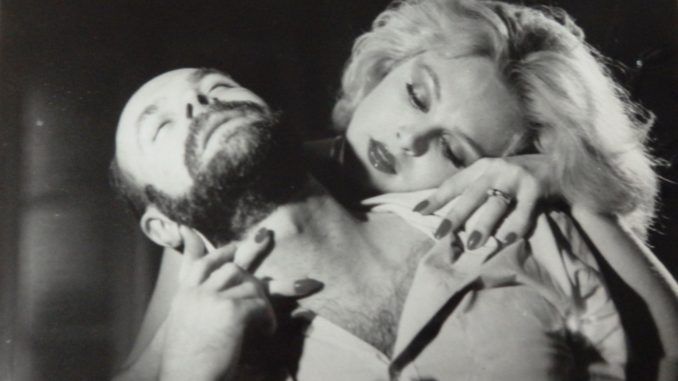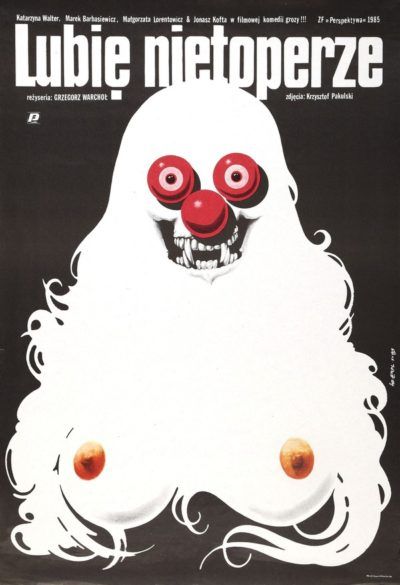
Rating: C
Dir: Grzegorz Warchol
Star: Katarzyna Walter, Marek Barbasiewicz, Malgorzata Lorentowicz, Edwin Petrykat
Personal taste is a strange thing. When I read positively gushing reviews of this, saying things like, “This is your new favourite cult film classic, just waiting to be discovered,” I legitimately have to pause and check. Is there perhaps some other 1986 Polish film called I Love Bats, which I should have been watching instead? Nope, this is the same entity. It’s not even one of those cases where I may not like a movie, yet can see its potential appeal to others e.g. Pulp Fiction. This just kinda sits there, occasionally reminding me of superior films. It’s one of those where I felt impelled to get the review written quickly after the credits rolled, because I knew little of it would stick in my memory.
Mind you, this may reflect my ongoing struggle with Polish “horror” cinema in general, quotes used advisedly. It doesn’t just appear to work on a different wavelength to me, it operates in a different dimension. I’ve as much trouble getting my brain around these films as visualizing a tesseract. Demon. Lokis: A Manuscript of Professor Wittembach. Wilczyca. All of them odd, droll and, as far as I’m concerned, completely impenetrable and offering no emotional connection. At this point, I am beginning to conclude, it’s not me, it’s them. Some of this might be fuelled by the Communist imperative – lingering in some cases – to view cinema as Important Artform. Being merely entertaining is a trait of capitalist running dogs and their lackeys. Regular readers know how I feel about message movies.
 This is, at least, light-handed in its morality. Or perhaps it’s just too densely packed, pushing any message over the cinematic event horizon, to a point from which nothing can escape to an external viewer. It seems oddly inconsistent, in any case. The heroine is Izabela (Walter), who lives with her aunt (Lorentowicz), and is coming under pressure to find a nice man and settle down. Izabela has no interest in this, being happy with her current lifestyle. This involves adopting various identities, luring men to remote areas, and drinking their blood. For Izabela is a vampire. How and why, are questions in which the film is simply not interested.
This is, at least, light-handed in its morality. Or perhaps it’s just too densely packed, pushing any message over the cinematic event horizon, to a point from which nothing can escape to an external viewer. It seems oddly inconsistent, in any case. The heroine is Izabela (Walter), who lives with her aunt (Lorentowicz), and is coming under pressure to find a nice man and settle down. Izabela has no interest in this, being happy with her current lifestyle. This involves adopting various identities, luring men to remote areas, and drinking their blood. For Izabela is a vampire. How and why, are questions in which the film is simply not interested.
This semi-awkward status quo is interrupted by the appearance in her aunt’s shop by Rudolf Jung (Barbasiewicz), who buys one of Izabela’s bat-themed tea-sets. I guess this was in the days before Hot Topic. Subsequently seeing him on television, she realizes he is actually a renowned psychiatrist; yes, he is a shrink called Prof. Jung. Izabela signs into his facility (in reality, the stunning Moszna Castle) to receive treatment for her “delusion” about being a vampire. While there, she tries to continue her predations, by telling other patients she’s there because she’s a nympho, though the reaction is drily underwhelming, most of them not taking the hint. Nor can she convince Rudolf of her true nature; even her failure to show up on X-rays (likely a first for a vampire film) is written off as an equipment malfunction.
There’s an obvious hole in the narrative here. If she actually wanted to convince Jung of her state, her lack of reflection in a mirror would seem fairly conclusive proof. There’s also a contradiction between Izabela’s apparent initial contentment with her lot, and the sudden desire to fling herself at the Professor. It begins as almost espousing an ideology of feminist independence, but the moral by the end is that a good shag is all a woman needs, to fix what ails her. Conversely, there are hints Rudolf is gay. “I don’t like girls,” he says when spurning Izabela’s initial seduction attempt, in her hooker persona. Turns out a good shag is all Jung needs, to be cured of that too.
It’s a startlingly uneven mix of scenes that work and those which are a swing and miss. I loved the sequence where Izabela attacks a man in his van on the crest of a hill. When she’s done, she gets out, pushes the car so it rolls slowly backwards out of sight, then starts walking towards the camera. A few seconds later, after she obligingly steps to one side, giving the camrra a better view, there’s a thoroughly implausible Giant Fireball in the background (below). Remind me never to purchase an eighties Polish vehicle: they are clearly unsafe at any speed. But, like the X-ray thing, it’s an example of the movie playing with and poking straight-faced fun at, the conventions of cinema.
 Yet at the other end, there’s stuff which, to be very charitable, is lost in translation. A bar where a patron suddenly takes her top off and starts dancing, to the complete disinterest of the other patrons, who don’t even appear to notice. Or the later sequence where Prof. Jung suddenly seems to have known all along that vampires exist – but only men can be one. So he takes Izabela to a multinational prison for them, which consists of cages on a Polish beach. It comes out of nowhere, and heads back there as well, never demonstrating any relevance to the rest of the story. Did this make more sense i.e. any at all, to audiences back in the day? Was it a… /Googles Poland in the eighties martial law reference? As mentioned earlier, impenetrable seems its middle name.
Yet at the other end, there’s stuff which, to be very charitable, is lost in translation. A bar where a patron suddenly takes her top off and starts dancing, to the complete disinterest of the other patrons, who don’t even appear to notice. Or the later sequence where Prof. Jung suddenly seems to have known all along that vampires exist – but only men can be one. So he takes Izabela to a multinational prison for them, which consists of cages on a Polish beach. It comes out of nowhere, and heads back there as well, never demonstrating any relevance to the rest of the story. Did this make more sense i.e. any at all, to audiences back in the day? Was it a… /Googles Poland in the eighties martial law reference? As mentioned earlier, impenetrable seems its middle name.
The poster (above) likely adds to the overall WTFness. I’d look at that, and have absolutely no clue of what to expect. I’m not going to say it’s inappropriate, however. One of the characters is a joke salesman (plastic googly eyes, etc.) who is – very loudly – the only one amused by his own products. By the end, I was feeling along the same lines as everyone else: not in on the joke. I can safely say, contrary to some claims, this is not “the best ‘80s vampire film you’ve never seen.”
This review is part of our October 2023 feature, 31 Days of Vampires.
